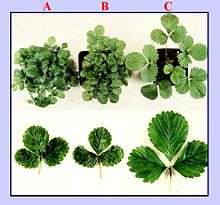Strawberry vein banding virus
| Strawberry vein banding virus (SVBV) | |
|---|---|
| Virus classification | |
| Group: | Group VII (dsDNA-RT) |
| Family: | Caulimoviridae |
| Genus: | Caulimovirus |
| Species: | Strawberry vein banding virus |
| Synonyms | |
|
Yellow vein banding virus | |

Strawberry vein banding virus (SVBV) is a plant pathogenic virus and a member of the family Caulimoviridae.
Strawberry vein banding virus (SVBV) was first described by Frazier (1955) after differential aphid transmission to susceptible wild strawberries. He described disease symptomatology, identified wild strawberry plants as suitable virus indicators, and demonstrated virus transmission by various aphids, dodder (Cuscuta subinclusa), and grafting. Virus-vector interactions (i.e., specificity of aphid species, acquisition access and retention times, semi-persistent manner of transmission, and transmission efficiency), and the inability to transmit the virus via sap were established by Frazier (1955). Similar studies focusing on aphid vectors of SVBV and symptomatology were used as the basis for naming the virus (Prentice, 1952; Schöniger, 1958; Frazier and Posnette, 1958; Frazier, 1960; Mellor and Forbes, 1960; Miller and Frazier, 1970; Frazier and Converse, 1980).
Stenger et al. (1988) purified and cloned the SVBV genome (pSVBV-E3). By the techniques available at that time, Stenger and coworkers were unable to demonstrate the infectivity of the clone. Rub-inoculation of the excised SVBV DNA, as a linear monomer or self-ligated circular genome, failed to result in infection. In contrast, parallel control experiments demonstrated that a clone of CaMV was infectious to turnip after mechanical inoculation (Al-Kaff and Covey, 1994; Stenger et al., 1988).
The infectivity of the cloned SVBV genome in pSVBV-E3 and completion of Koch’s postulates for SVBV was accomplished by particle-gun bombardment of UC-5 strawberry plants with gold particles coated with the viral DNA (Mahmoudpour, 2000, 2003). However, with this method of inoculation was inefficient (15-20% infection). Agroinoculation proved to be a far more efficient inoculation procedure (100% infection) as demonstrated by Mahmoudpour (2000, 2003).
References
- Al-Kaff, N. and Covey, S. N., 1994. Variation in biological properties of cauliflower mosaic virus clones. J. Gen. Virol. 75, 3137-3145.
- Frazier, N. W., 1955. Strawberry vein banding virus. Phytopathology 45, 307-312.
- Frazier, N. W., 1960. Differential transmission of strains of strawberry vein banding virus by four aphid vectors. Plant Disease Rep. 44, 436-437.
- Frazier, N. W. and Posnette, A. F., 1958., Relationships of the strawberry viruses of England and California. Hilgardia 27, 455-514.
- Frazier, N. W. and Converse, R. H., 1980. Strawberry vein banding virus. Description of Plant Viruses No. 219. Commonwealth Mycological Institute, Association of Applied Biologists, Kew, Surrey, England.
- Mahmoudpour, M. M. A., 2000. Strawberry vein banding caulimovirus: biology and characterization. PhD dissertation. University of California, Davis. pp. 124.
- Mahmoudpour, A. 2003. Infectivity of recombinant strawberry vein banding virus DNA. J. Gen Virol. 84: 1377-81.
- McBride, K. E. and Summerfelt, K. R., 1990. Improved binary vectors for Agrobacterium-mediated plant transformation. Plant Mol. Biol. 14, 269-276.
- Mellor, F. C. and Forbes, A. R., 1960. Studies of virus diseases of strawberries in British Columbia. Can. J. Botany 38, 343-352.
- Miller, P. W. and Frazier, N. W., 1970. Strawberry vein banding virus. pp. 8–10 in: Virus diseases of small fruits and grapevines. N. W. Frazier, Ed. University of California, Division of Agricultural Sciences, Berkeley.
- Schöniger, G. 1958. Erdbeervirosen in Deutschland. III. Das Erdbeer-Nekrosevirus: fin weiteres nicht-persistentes virus. Phytopathologische Zeitschrift 32, 325-332.
- Stenger, D. C., Mullin, R. H. and Morris, T. J., 1988. Isolation, molecular cloning, and detection of strawberry vein banding virus DNA. Phytopathology 78, 154-159.
External links
- ICTVdB - The Universal Virus Database: Strawberry vein banding virus (SVBV)
- Family Groups - The Baltimore Method